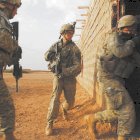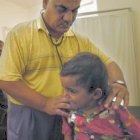By: Brendan O’Malley
Send to a friend
The details you provide on this page will not be used to send unsolicited email, and will not be sold to a 3rd party. See privacy policy.
Iraq is rebuilding its science base but fear of attack means refugee academics are slow to return, reports Brendan O’Malley.
Two years ago many of Iraq’s scientists would have feared the consequences of a US presidential election won on a platform of the withdrawal of US troops.
A campaign of assassinations had seen 340 academics murdered between 2005 and 2007 (see Nearly 200 Iraqi academics killed since 2003).
The concerted attempt to liquidate the country’s intellectual elite, particularly its leading scientists and medical experts, drove thousands of researchers and practitioners abroad.
Bombings at universities pushed student attendance down to 30 per cent in many departments. In one incident at Baghdad’s Mustansiriya University in January 2007, 70 students were killed and 170 injured.
A UNESCO study warned that targeted violence had brought the university system to the brink of collapse.
How times have changed. Violence has dropped 80 per cent since early 2007, according to US estimates. Confident that the situation is stabilising, the US has agreed to pull out combat troops by May 2010; the British will pull out by July 2009.
And Iraq’s scientists are being urged to lead the country’s redevelopment.
Raising scientific capacity
"The situation is much better now. Most of the country is safe," says Salam Khoshnaw, deputy minister of Higher Education and Scientific Research. "Of course we can’t predict what will happen tomorrow or the day after. But many scientists have returned and, compared with two or three years ago, at each university I have found thousands of lecturers working without any problem."
The race is now on to pull Iraq out of the scientific backwater it has become through two decades of war, UN sanctions and dictatorship. In the 1970s and 1980s its higher education system was the envy of the Arab world. But since then it has been starved of resources and isolated from the rest of the world.
Khoshnaw says most academics in Iraq today have never visited foreign institutions. Now the government is trying to send as many scientists abroad as possible, in the hope it improves research capacity.
"This is our mission," says Khoshnaw. "Under Saddam Hussein’s regime nobody could go anywhere to do research, but now we are opening the gates."
For a country that has lost so many experts to exile it might seem a high-risk strategy: last year the government sent 1,500 lecturers and students abroad at a cost of US$10 million. Now there are plans to send 10,000 lecturers and students abroad over the next four years for research or to obtain masters or PhD degrees. Next year research scholarships will be given out in medicine, engineering and other scientific disciplines.

The US has agreed to pull out troops by May 2010
Flickr/Army.mil
"We will support anyone — lecturers or students — who would like to conduct research abroad," Khoshnaw says. "But even any students or lecturers who would like to conduct research inside Iraq at Iraqi universities, we will support them, all the expenses and everything."
The danger of exacerbating the brain drain might be offset by another bold policy: raising academic salaries in Iraq.
Education on the agenda
The battle to upgrade the status of lecturers and teachers was led in the Iraqi parliament by the lively president of the Parliamentary Education Committee, Alaa Makki, a former haematologist at Baghdad Medical College.
He began by demanding better protection for "Iraqi scientists, Iraqi brains and Iraqi teachers," and won backing for a law to double university teachers’ salaries and triple those of teachers with PhDs. This makes rates competitive with those of Jordan and Syria. A lecturer in Iraq during Saddam’s regime used to take home US$50 monthly.
"Now the salary is more than US$2,000 a month," says Khoshnaw. There are also proposals to offer returning academics land or accommodation that they can buy over 10–15 years.
But Makki is under no illusion that pay alone will help science and technology research spearhead Iraq’s development.
His committee is pressing for action on four objectives: raising standards in education and research; matching research to social and economic needs; enhancing the sense of belonging to Iraq among students and academics; and updating the curriculum, teaching methods and laboratories nationwide.
Barriers to progress
This is a tall order in a country starved of resources for more than two decades, where researchers have had to travel to neighbouring countries to conduct experiments.
Obay Al-Dewachi, president of the University of Mosul, says: "From 1990 up to the recent war, we got no equipment, nothing. Then when the American troops entered the city many of the departments in the college of science were destroyed [by looters]: the departments of biology, physics, geology; also the colleges of medicine, agriculture and pharmacy".
Re-equipping has been a long, slow process and is hindered when supplies come from abroad by the reluctance of drivers to enter the region.
At Al-Dewachi’s university, which has 8,000 lecturers and 126 science departments, electricity is available for only four hours a day.
"The problem is absence of materials and equipment," he says. "For example, if you need to do a chemical experiment, the absence of equipment will force you to travel to other Iraqi universities or to Jordan or Syria."



An Iraqi doctor treats a child
USAID/Debbi Morello
Makki, who served two years in Abu Ghraib prison and was sentenced to death under Saddam Hussein’s regime, has also been battling to double the education budget.
Even if a higher budget is secured, Khoshnaw concedes that there is "hesitation" to entrust funds to universities to buy resources. "Corruption is still a problem, we would like to take it very slowly," he says.
Nor is everyone convinced that the occupying powers will follow up their military intervention with adequate capacity-building.
There have been some positive developments, however. Al-Dewachi says this month American publishers sent more than 14,000 free scientific books to his university, in addition to a previous gift of some 15,000.
But he is bitter about Britain’s level of support for research scholarships given its historic ties — it controlled Iraq for four decades before the 1958 revolution under a League of Nations mandate.
"Do you know how many scholarships they offer us from across all the British universities? Twenty. We feel disappointment. We used to pay £200 a year to attend British universities, now it costs £17,000 — and students sometimes have to spend two months in Jordan or Syria just to get a visa to go there."
In fact, according to the UK’s Department for Innovation, Universities and Skills, the number of known UK scholarships for Iraq has been cut from 20 in 2007–8 to 14 in 2008–9.
Consequently, students are sent to cheaper destinations such as Armenia, Malaysia, Turkey and Ukraine, whose degrees are not held in the same regard.
One test of whether the new policies on scholarships and salaries are working would be the return en masse of refugee academics, scientists and doctors. But the signs are not encouraging.
Fear of attack
Although Khoshnaw denies there are trustworthy figures, a spokeswoman from his own ministry told the Los Angeles Times in October 2008 that 6,700 professors have fled Iraq since 2003, while only 150 have returned.
The most likely reason is fears over safety. Although security has significantly improved, with attacks on civilians in Baghdad down 90 per cent from 2006 levels, academics and education officials are still occasionally being murdered.
For instance, in February 2008 there was an assassination attempt on the deputy dean of Baghdad University’s School of Medicine. In March, Khalid Nasir al-Miyahi, the only neurosurgeon in Basra and a professor at the city’s university, was kidnapped and murdered, his body left on the streets. In December the dean of the University of Mosul’s School of Medicine was wounded by gunmen. And on 15 January the minister of higher education escaped injury when a roadside bomb exploded near his convoy in Baghdad.
At a conference hosted in Paris by UNESCO and the Sheikha of Qatar in November, 200 Iraqi ministers, MPs,university presidents and academics demanded urgent action to provide protection against, and an end to impunity, for such targeted attacks. They called on the government to enforce international human rights law by ensuring such crimes are investigated and urged the UN to monitor such efforts.
"The situation is not 100 per cent settled," Makki concedes. "There are still assassinations of academics and people are anxious about being killed or kidnapped. And that makes our friends who live abroad uncomfortable about returning to Iraq."
Nevertheless, it is a measure of progress that protection of academics was only part of the focus at the Paris conference. As much attention was devoted to two other pressing concerns: how to ensure that Iraqi refugees and internally displaced Iraqis have access to education, and how to rebuild the country’s universities.
Brendan O’Malley is author of Education Under Attack: A global study on targeted political and military violence against education staff, students, teachers, union and government officials and institutions: www.unesco.org/education/attack![]()
![]()
![]()
More on Capacity building


Script media release
Journalists offered ‘big break’ mentoring opportunity from Radio Nigeria
03/04/19












